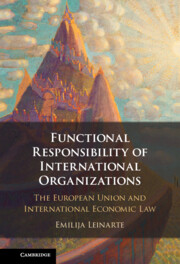 Functional Responsibility of International Organisations
Functional Responsibility of International Organisations from Part II - Functional International Responsibility
Published online by Cambridge University Press: 09 December 2021
This book concludes that in international economic law, shared responsibility is distributed among subjects of international law which are part of a common institutional structure based on which of them is best placed to remedy breach. This is so because the purpose of international economic adjudication is restorative rather than punitive. Allocation of responsibility does not follow attribution of conduct (or breach) but instead depends on the system of remedies available under a given treaty. Allocation of responsibility is thus a dynamic concept which is not tied to breach but rather depends on the nature of the treaty regime in question.
To save this book to your Kindle, first ensure no-reply@cambridge.org is added to your Approved Personal Document E-mail List under your Personal Document Settings on the Manage Your Content and Devices page of your Amazon account. Then enter the ‘name’ part of your Kindle email address below. Find out more about saving to your Kindle.
Note you can select to save to either the @free.kindle.com or @kindle.com variations. ‘@free.kindle.com’ emails are free but can only be saved to your device when it is connected to wi-fi. ‘@kindle.com’ emails can be delivered even when you are not connected to wi-fi, but note that service fees apply.
Find out more about the Kindle Personal Document Service.
To save content items to your account, please confirm that you agree to abide by our usage policies. If this is the first time you use this feature, you will be asked to authorise Cambridge Core to connect with your account. Find out more about saving content to Dropbox.
To save content items to your account, please confirm that you agree to abide by our usage policies. If this is the first time you use this feature, you will be asked to authorise Cambridge Core to connect with your account. Find out more about saving content to Google Drive.